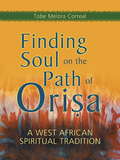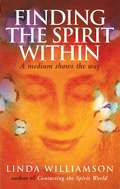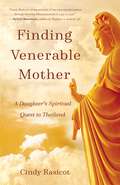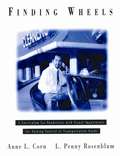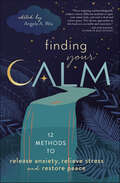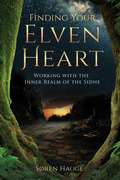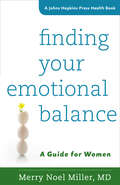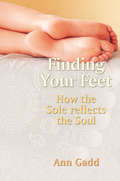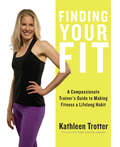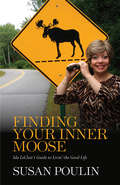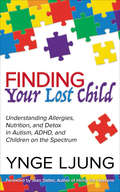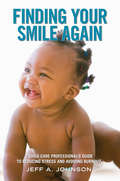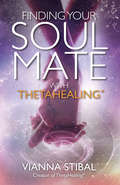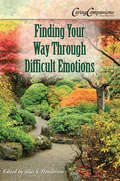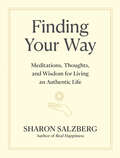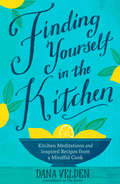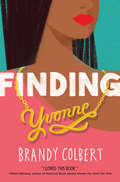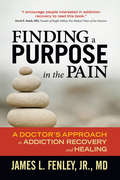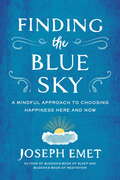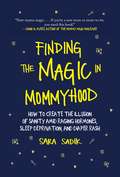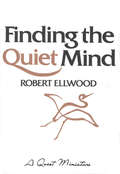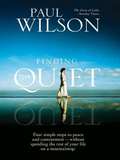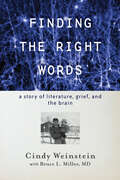- Table View
- List View
Finding Soul on the Path of Orisa: A West African Spiritual Tradition
by Tobe Melora CorrealIn the realm of African spiritual pathways, no tradition is so widely embraced and practiced as the West African religion Orisa. Awakened by her own spiritual journey, Tobe Melora Correal, an initiated priestess in the Yoruba-Lukumi branch of Orisa, guides us along this blessed road. FINDING THE SOUL ON THE PATH OF ORISA provides a fresh look at these ancient teachings and emphasizes introspection and inner work over the outward manifestations of Orisa's practices. Correal debunks misconceptions surrounding the tradition, drawing us into a lushly textured, Earth-centered spiritual system-a compassionate and useful roadmap for revering God.
Finding The Spirit Within: A medium shows the way
by Linda WilliamsonLinda Williamson, acclaimed medium and author of the bestselling Contacting the Spirit World, recounts her own experiences of living and working as a medium.Finding the Spirit Within offers a fascinating new approach to mediumship. Linda Williamson shows how to develop our spirituality with the help of spirit guides and teachers - and so find inner wisdom. She gives insights into what it is really like to be a medium and explains how spirit teachers can help us attune to our own inner world. Topics covered are how to obtain spirit guidance, how to become more spiritually aware, the development of healing and how to discover one's purpose in life. Throughout, there are practical exercises to assist the reader in unfolding their spiritual potential.Everyone who is interested in developing their spiritual potential will find this book both fascinating and extremely helpful.
Finding Venerable Mother: A Daughter's Spiritual Quest to Thailand
by Cindy RasicotWhen Cindy moves to Thailand with her husband and teenage son, she finds herself strangely adrift in a foreign culture, unprepared for the challenges she encounters there. On an impulse she signs up for a conference where she unexpectedly meets a Thai Buddhist nun, Venerable Dhammananda Bhikkhuni, who leads her on a spiritual journey from which there is no turning back. Along the way she discovers the beauty of the Thai people and culture. This soulful and engaging memoir is the story of one woman&’s journey of physical, emotional, and spiritual healing through her connection to a loving Buddhist teacher who fully accepts and nurtures her in a way her own mother never did. Finding Venerable Mother is a testimony to the power of faith, forgiveness, and love.
Finding Wheels: A Curriculum for Nondrivers with Visual Impairments for Gaining Control of Transportation Needs
by Anne L. Corn L. Penny RosenblumThis text comprises explanatory material, activities, and numerous case studies profiling individuals and their families. The goal is to help visual impaired adolescents come to terms with the practical difficulties, the emotional obstacles, and the serious consequences of their attitudes toward getting around. Annotation c. Book News, Inc., Portland, OR (booknews.com)
Finding Your Calm: 12 Methods to Release Anxiety, Relieve Stress, and Restore Peace
by Shannon YrizarryYour Relaxation Solution is HereTwelve of Llewellyn's top authors introduce you to a dozen New Age relaxation techniques that can positively impact all areas of your life. Pulling from both scientific and spiritual methods, these experts present simple practices that will help you achieve a state of calm, including:Body Wisdom by Emily FrancisEmpaths by Kristy RobinettAromatherapy by Gail BussiVisualization by Chanda ParkinsonChakra Work by Jiulio ConsiglioAstrology by Leah PattersonVagus Nerve by Cyndi DaleMeditation by Shai TubaliEFT by Amy B. ScherGood Sleep by Angela WixASMR by Shannon YrizarryMindfulness by Melanie KleinFeaturing fun, conversational essays, this book explores a wide range of ways to promote peace and relaxation. You'll learn how to use essential oils, listen to your emotional and energetic bodies, tailor your self-care routine to your sun sign, change your response to stress through tapping, and much more. Finding Your Calm helps you tune into your innate intuition and find the right modality for any moment.
Finding Your ElvenHeart: Working with the Inner Realm of the Sidhe
by Søren HaugeA guide to untaming yourself on a quest to discover your inner Sidhe nature, your ElvenHeart, for wholeness, healing, and awakening • Explores who the Sidhe are and shares close encounters with them in our modern world • Invites you to discover your ElvenHeart by journeying through the four portals of the StoneAnchor, the FlowDancer, the FireDreamer, and the WindSinger • Offers gifts in the form of simple exercises to bring you into contact with your magical kin and rewild yourself Awaken to your closest kin, the Sidhe (pronounced &“Shee&”), and let them inspire you to rediscover your gentle, wild, innermost nature, your ElvenHeart. Also known as the Faery People or the Good Neighbors, the Sidhe are not just figments of human imagination. They are reaching out to us, encouraging a reunion with humanity, and inviting us to partner with them in restoring wholeness to the world. As they reveal, serving Gaia or healing the Earth from the present crisis is not a convenience--it is a necessity. Offering an experiential guide to reconnecting with the Sidhe and our inner ElvenHeart, Søren Hauge explores who the Sidhe are, how both humanity and the Sidhe emerged from a common ancestor, and how their untamed nature and deep wisdom bears significance for an aspect of our inner being that has gone to sleep. While the Sidhe did not enter the physical dimension as deeply as we did, they are real beings, very close to us, and different from angels, devas, and nature spirits. Søren introduces his own Sidhe contact, Fjeldur, and shares close encounters others have had with these beings in our modern world. He also takes you on a journey of rewilding through four portals--the StoneAnchor, the FlowDancer, the FireDreamer, and the WindSinger--to discover the treasure of your ElvenHeart at the core of your being. In the course of this, Søren offers gifts in the form of simple exercises that help bring you into contact with your magical kin and your inner Sidhe nature. Through this wild quest, the journey of untaming yourself, you will connect with your Sidhe partners, unfold their inner gifts in your own being, and rediscover the forgotten land of innocent wildness and gentle power within you.
Finding Your Emotional Balance: A Guide for Women (A Johns Hopkins Press Health Book)
by Merry Noel MillerA wise, empathetic guide to emotional and mental health for women of all ages.Women are twice as likely as men to become depressed. While they seek help for mental disorders more often than men, they also seek to help others, trying to keep everyone happy while taking care of parents, spouses, and children. Sometimes, doing it all is doing too much.In Finding Your Emotional Balance, Dr. Merry Noel Miller offers women of all ages advice for coping with life’s challenges while increasing its joys. Drawing on her three decades of experience as a psychiatrist specializing in women’s mental health—as well as her own personal struggles with depression and grief—she explains the special vulnerabilities and strengths of women during adolescence, the childbearing years, menopause, and late in life. Dr. Miller opens each chapter with stories about women who are dealing with issues related to their stage in life. She discusses common mental disorders in the context of life stages, exploring the symptoms of depression, anxiety, substance abuse, bipolar disorder, and unresolved grief. She also offers a variety of remedies, suggesting medical and nonmedical approaches to finding emotional balance even in the most stressful times. Each chapter ends with a list of suggested readings and websites.
Finding Your Feet
by Ann GaddExamining the mind-body connection in specific relation to the chakras and feet, this treatment manual will appeal to both holistic professionals and dabblers. Key issues and ailments are listed for each particular aspect of the foot, along with further explanations and case histories-including overall shape, shoes, broken nails, calluses, footprints, and bunions. The format and illustrations allow for quick reference as well as in-depth insight when required.
Finding Your Fit: A Compassionate Trainer’s Guide to Making Fitness a Lifelong Habit
by Kathleen TrotterTen simple, practical ways to get moving, get healthy, and feel great. Wanting to get on track and actually getting (and then staying) on track are two totally different things. The million-dollar question is: how do we find the inner motivation to go from thinking about a healthier lifestyle to actually adopting one? How do we get off the sofa and out the front door? Finding Your Fit: A Compassionate Trainer’s Guide to Making Fitness a Lifelong Habit provides readers with practical tools that will allow them to connect the dots between wanting to make a health and fitness change, and actually making it.
Finding Your Inner Moose: Ida Leclair's Guide To Livin' The Good Life
by Susan PoulinMeet Ida LeClair, the funniest woman in Maine. Ida is also a newly minted "Certified Maine Life Guide" who wants to help you live a better, happier life. Ida is a lifelong resident of Mahoosuc Mills, a hard-to-find, but oh-so-familiar town in Western Maine, where she lives in a tidy and tastefully decorated double-wide with high school sweetheart Charlie and adorable dog Scamp. Most importantly, Ida (a.k.a. the alter ego of popular performer Susan Poulin) is a daughter, sister, wife, and best friend who draws upon her experiences (as well as those of the noble and majestic moose) to offer practical and hilarious advice on relationships, physical fitness, stress, housecleaning, work, shopping, fun, and more. (If you are looking for impractical, woo-woo advice from a glammed-up, over-educated, fancy-schmancy life coach, just keep looking!) Finding Your Inner Moose features such sections as: What Did I Do Wrong to Deserve this Turkey Gobbler Neck; How Many Points in Cabbage Soup?; I Can't Die Today Because if Anyone Saw the State of My House I'd Just Die; Feng Shui-ing the Double Wide; Slaying Energy Vampires; and Spousal Deafness. This book is 100% Ida, who, as her husband Charlie, says, "just loves giving advice to people, whether they ask for it or not!"
Finding Your Lost Child: Understanding Allergies, Nutrition, and Detox in Autism, ADHD, and Children on the Spectrum
by Ynge LjungFinding Your Lost Child teaches parents how to help children on the autism spectrum (A-spectrum) become more harmonious and happier by living allergy-free!In the last 20+ years, A-Spectrum children have increased in unexplainable numbers. As a result, more and more parents must learn how to incorporate them into society, by helping their children and by educating the general population. For parents of children on the A-spectrum who want to learn how to help their child become healthier, have fewer temper tantrums, and have less cravings for sugars and detrimental foods, Finding Your Lost Child shows parents how to have a healthy and happy family by changing their lifestyle and learning how to alleviate—and even eliminate—allergies. Ynge Ljung&’s guide outlines how doing so causes the whole family to feel and act better—even seeing progress in as little as two weeks. Ynge teaches parents:How to eliminate allergies in their own homeThe benefits of a healthy lifestyleHow to shop at the grocery store and how to really read food labelsWhat pro and pre-biotics really areA different approach to communication with their non-verbal child Not only do parents learn how to help children on the A-spectrum, but the whole family benefits from living a harmonious, allergy-free life!
Finding Your Own North Star: Claiming the Life You Were Meant to Live
by Martha BeckSelf-help, attempts to teach self-actualization.;
Finding Your Smile Again
by Jeff A. JohnsonUsing warmth and humor, this book offers techniques for dealing with the everyday stress of being a childcare professional. Written by a caregiver who's been there, it describes the symptoms and causes of burnout, with advice to get through each challenge.
Finding Your Soul Mate with ThetaHealing
by Vianna StibalMany of us are born into this world with the feeling and knowing of what being loved by another person should feel and be like, but we lack the feeling and knowing of how to fulfill this desire in the highest and best way. The desire for a soul mate is the ancient need to become the divine couple whose union breathes new life into the world. Seen from this context, finding your soul mate has deeper ramifications than a purely romantic desire; the union of a soul mate is about the creation of an energy that is a candle to bring illumination to the world.The content of this book is designed for spiritually romantic people who have not lost the faith that there is someone out there that has a divine understanding of us, and that two people are brought together for a divine plan that will contribute towards a higher purpose. Based on Vianna Stibal's own experience of finding her soul mate, this book will reaffirm your belief in true love and will explain how, using ThetaHealing®, you can bring your soul mate into your life.
Finding Your Way Through Difficult Emotions (CaringCompanions)
by Silas HendersonAnger. Stress. Resentment and feelings of hurt. Grief. These are all very real emotions that can cast shadows over every facet of our lives, making the path to peace and wholeness almost impossible to discern. We should never underestimate how strong our emotions can be, but we should also recognize that we aren&’t powerless when confronting difficult emotions. Each of us is capable of moving forward to a place of healing and wholeness. Reflecting on the themes of anger, stress, forgiveness, grief, and, finally, peace, readers will find a source of strength and comfort in the five reflections presented in this invaluable book from our CaringCompanions series.
Finding Your Way: Meditations, Thoughts, and Wisdom for Living an Authentic Life
by Sharon SalzbergFind a sense of calm and hope with this illustrated gift book from the world renowned and bestselling meditation teacher as she offers bite-sized tidbits of inspiring advice.Finding Your Way is the newest book from the one of the most beloved and bestselling meditation teachers. In dozens of clear and inspiring entries, readers will be reminded that there are many ways to stay calm and move forward. From choosing to simply "do the good that is in front of you," to reading a meaningful piece from an interview with a kind leader, to quotes from people Sharon admires, and reminders of how to practice meditation, Finding Your Way will show readers that they are always on the right path, because it is their own. Each thought, whether a single quote or a short essay, is presented in a visually calm manner, with dozens of four color illustrations to enhance and inspire the experience throughout the book.
Finding Yourself in the Kitchen: Kitchen Meditations and Inspired Recipes from a Mindful Cook
by Dana VeldenMany books teach the mechanics of cooking and even inspire us to cook; not many dwell on the kitchen's ability to be a place of awakening and joy. In Finding Yourself in the Kitchen, Dana Velden asks you to seek deeper meaning in this space and explores what cooking can teach about intimacy, failure, curiosity, and beauty. Finding Yourself in the Kitchen is a book of essays, each focused on a cooking theme that explores how to practice mindfulness in the kitchen--and beyond--to discover a more deeply experienced life. It also offers meditation techniques and practical kitchen tips, including 15 of Velden's own favorite recipes. What happens when we find ourselves in the kitchen? What vitalizes, challenges, and delights us there? An extension of her popular "Weekend Meditation" column on TheKitchn.com, this book offers you the chance to step back and examine your life in a more inspired way. The result is a reading experience that satisfies, nourishes and inspires.
Finding Yvonne
by Brandy ColbertFor fans of Nicola Yoon and Nina LaCour comes a striking novel about difficult choices from acclaimed author Brandy Colbert.Since she was seven years old, Yvonne has had her trusted violin to keep her company, especially in those lonely days after her mother walked out on their family. But with graduation just around the corner, she is forced to face the hard truth that she just might not be good enough to attend a conservatory after high school.Full of doubt about her future, and increasingly frustrated by her strained relationship with her successful but emotionally closed-off father, Yvonne meets a street musician and fellow violinist who understands her struggle. He's mysterious, charming, and different from Warren, the familiar and reliable boy who has her heart. But when Yvonne becomes unexpectedly pregnant, she has to make the most difficult decision yet about her future.From the author of Pointe and Little & Lion, comes another heartfelt novel about the twists and turns that can show up on a path meant only for you.
Finding a Purpose in the Pain
by James L. Fenley Jr.Addiction medicine specialist Dr. James Fenley, Jr. shares powerful life lessons and spiritual truths he's learned from twenty-five years of practice and from his own recovery journey through chronic depression, anxiety, and his wife's addiction.
Finding the Blue Sky: A Mindful Approach to Choosing Happiness Here and Now
by Joseph EmetJoseph Emet explores the intersection between Positive Psychology--the study of what makes people happy--and the ancient wisdom of Buddhism. Positive Psychology--with its focus not on mental "disease," but rather on what actually makes people happy--has revolutionized the way that we look at mental health. What many people don't realize, however, is that Positive Psychology is not as young a field of inquiry as we think. In fact, according to Joseph Emet, the original positive thinker was the Buddha himself. In this wise and inspiring book, Emet traces the fascinating intersection between the age-old wisdom of Buddhism and the latest scientific research into what makes people happy. In this book readers will discover: * How to replace negative thinking with positive thinking * How to move from frenzied thinking to quiet contemplation* The duty we have to others to live a happy life As Joseph explains in this work, the blue sky of happiness is found just beyond the grey clouds of sadness, everyday concerns, stress, or anxiety. Readers will find that the advice in this book can act as the gentle wind that clears those clouds away.From the Trade Paperback edition.
Finding the Magic in Mommyhood: How to Create the Illusion of Sanity amid Raging Hormones, Sleep Deprivation, and Diaper Rash
by Sara SadikIn the gaping cracks between our mommyhood expectations and the messy reality, magic shines through.So much legend, tradition, and everyday talk makes pregnancy out to be a magical experience. But there’s no sparkle, no glitter and glamour when you need to pee 3,302 times per night or are struggling to understand what each baby wail means. Finding the Magic in Mommyhood punctures those myths that becoming a mom is all radiance and bliss and balances the hopes and dreams of every new mom and mom-to-be by delivering a roller-coaster of emotion and honesty to recast every breakdown as a breakthrough.Sara knows, all around the globe, a mom is a mom is a mom. Regardless if baby’s first solid meal is pureed pear or . . . hummus. She shares her story of living in Dubai with NYC habits, a London-Lebanese mindset, and Palestinian perseverance to empower moms everywhere to find the good in the midst of the hard, discouraging, or overwhelming.Topics include the pre-preggo phase, pregnancy, and the first year of mommyhood, including how Sara adjusted when an X-ray revealed her baby had hip dysplasia—a congenital misalignment requiring her to wear a brace.Finding the Magic in Mommyhood tackles unexpected and even uncomfortable topics with ease and humor to help fellow moms dig extra deep to find strength, let alone magic in the moments when you resent this baby you’re supposed to love, loathe your husband, or lose yourself and want solely to find a glimpse of sanity . . . and you again.
Finding the Quiet Mind
by Robert EllwoodRobert Ellwood explains how to attain serenity through mental stillness. "Meditation is the Quiet Mind taking a little time out just to be itself."
Finding the Quiet Mind
by Robert EllwoodFinding the Quiet Mind is a practical approach to beginning meditation that will lead the reader step-by-step into finding more calmness and reaching inner resources of joy and power for daily life. It synthesizes teachings from both Eastern and Western philosophies in contemporary language appropriate for all modern readers, regardless of their religion or worldview, and assumes that most people can benefit from meditation without relying on an external teacher. Included are tips on body posture, breath, and mantras, as well as a chapter on mediating for the wellbeing of others. Author Robert Ellwood is Distinguished Professor Emeritus of Religion at the University of Southern California.
Finding the Quiet: Four simple steps to peace and contentment - without spending the rest of your life on a mountain top
by Paul F. WilsonA powerful book to help you move from chaos into tranquillity, from hecticness into peace, and from stress into joy-written by the man known as "the guru of calm. "The Quiet" is a place where you can't be touched by the noise and tensions of the modern world. A place where, no matter what's happening around you, you have time and space to breathe. Some people spend a lifetime of meditation practice and spiritual studies searching for it. The practices in Finding the Quiet are based on four simple steps that transform the way you feel and what you get out of life. Following these techniques can lead to:· peace of mind· clarity of thought· emotional stability· physical well-beingWe are also including A Piece of the Quiet, which provides fast and easy highlights for when you need a quick moment of calm. Whether you are a novice at meditation or a lifetime practitioner, the strategies presented in Finding the Quiet are powerful tools to take you where you want to be.
Finding the Right Words: A Story of Literature, Grief, and the Brain
by Cindy WeinsteinThe moving story of an English professor studying neurology in order to understand and come to terms with her father's death from Alzheimer's.In 1985, when Cindy Weinstein was a graduate student at UC Berkeley, her beloved father, Jerry, was diagnosed with early-onset Alzheimer's disease. He was fifty-eight years old. Twelve years later, at age seventy, he died having lost all of his memories—along with his ability to read, write, and speak. Finding the Right Words follows Weinstein's decades-long journey to come to terms with her father's dementia as both a daughter and an English professor. Although her lifelong love of language and literature gave her a way to talk about her grief, she realized that she also needed to learn more about the science of dementia to make sense of her father's death. To write her story, she collaborated with Dr. Bruce L. Miller, neurologist and director of the Memory and Aging Center at the University of California, San Francisco, combining personal memoir, literature, and the science and history of brain health into a unique, educational, and meditative work. Finding the Right Words is an invaluable guide for families dealing with a life-changing diagnosis. In chapters of profound and sometimes humorous remembrance, Weinstein relies on literature to describe the shock of her father's diagnosis and his loss of language and identity. Writing in response to Weinstein's deeply personal narrative, Dr. Miller describes the neurological processes responsible for the symptoms displayed by her father. He also reflects upon his own personal and professional experiences. In a final chapter about memory, Weinstein is able to remember her father before the diagnosis, and Miller explains how the brain creates memories while sharing some of his own. Their two perspectives give readers a fuller understanding of Alzheimer's than any one voice could.
